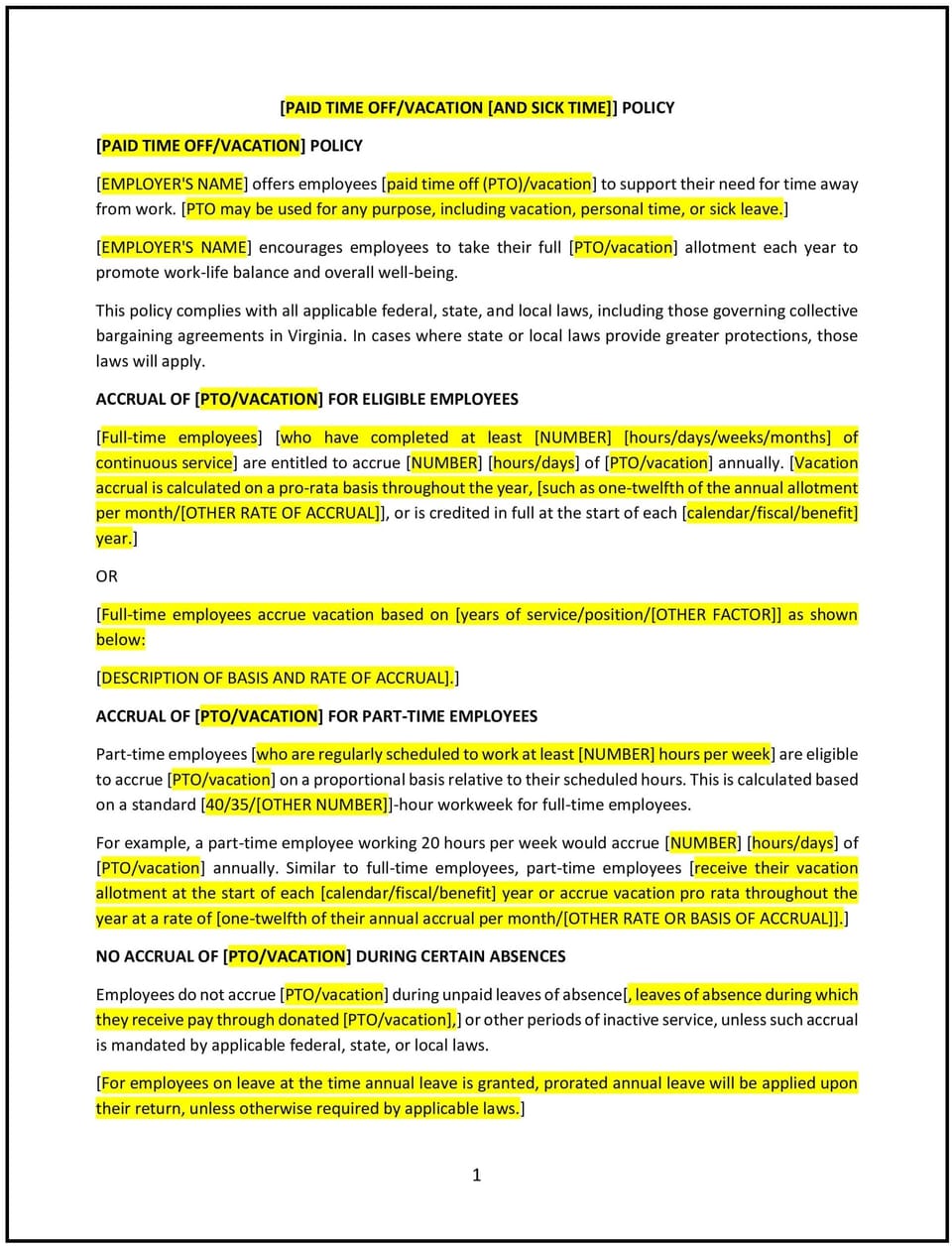Vacation policy (Virginia): Free template

This vacation policy is designed to help Virginia businesses manage employee vacation time by outlining eligibility, accrual, usage, and carryover provisions. The policy provides clear guidelines on how vacation time is accrued, how employees can request time off, and how unused vacation time is handled, ensuring a consistent approach to vacation management.
By implementing this policy, businesses can support employee well-being, enhance work-life balance, and establish a clear process for vacation requests, leading to a more productive and satisfied workforce.
How to use this vacation policy (Virginia)
- Define eligibility: Specify which employees are eligible for vacation time, including full-time, part-time, or temporary employees, and any service requirements such as length of employment.
- Establish accrual rates: Outline how vacation time is accrued, whether it’s based on hours worked, years of service, or another method. The policy should also define the annual accrual limit and when vacation time can begin to accumulate.
- Set usage guidelines: Provide a process for requesting vacation time, including notice periods, approval requirements, and any restrictions (such as blackout dates or peak periods).
- Address carryover rules: Define whether unused vacation time can be carried over to the next year, and if so, how much time can be carried over and for how long. Specify whether unused vacation is forfeited or paid out at the end of the year or upon termination.
- Explain holiday and leave overlap: Address how vacation time interacts with other types of leave, such as holidays, sick leave, or personal leave, and whether these days count as part of the employee’s vacation time.
- Handle termination of employment: Specify how unused vacation time is handled upon an employee’s termination or resignation, including whether it will be paid out or forfeited.
- Review and update regularly: Regularly review and update the policy to ensure it remains compliant with Virginia state laws, federal regulations, and any changes in company operations.
Benefits of using this vacation policy (Virginia)
This policy offers several benefits for Virginia businesses:
- Supports employee work-life balance: Providing clear guidelines for vacation accrual and usage helps employees manage their time off and maintain a healthy work-life balance.
- Increases employee satisfaction: Clear and fair vacation policies contribute to employee satisfaction, boosting morale and improving retention rates.
- Promotes consistency: A standardized approach to vacation time ensures that all employees are treated equally and that there are no misunderstandings about vacation entitlement.
- Reduces absenteeism: With a transparent vacation policy, employees are more likely to plan their time off in advance, minimizing disruptions to the business.
- Complies with state regulations: The policy helps businesses remain compliant with Virginia state laws regarding vacation accrual, leave, and pay.
- Improves planning: Clear guidelines on vacation time help businesses plan for staffing needs, especially during peak periods or when employees request extended leave.
Tips for using this vacation policy (Virginia)
- Communicate the policy clearly: Ensure that all employees are aware of the vacation policy and understand how to request time off. Include the policy in the employee handbook and discuss it during onboarding.
- Set clear expectations: Be transparent about the approval process, deadlines for vacation requests, and any restrictions that might apply to taking time off during peak business periods.
- Track vacation time accurately: Keep accurate records of employees’ vacation time accrual and usage to prevent discrepancies and ensure compliance.
- Be flexible when possible: Consider providing employees with some flexibility in how they use their vacation time, such as offering options for unpaid leave or flexible schedules.
- Review and update regularly: Periodically review the policy to ensure it is compliant with Virginia state laws, federal regulations, and any changes in company operations.
Q: Who is eligible for vacation time?
A: Full-time employees are typically eligible for vacation time, but part-time or temporary employees may also be included depending on the company’s policy. Eligibility may be based on length of service or specific roles within the business.
Q: How is vacation time accrued?
A: Vacation time is usually accrued based on the number of hours worked or years of service. The policy should specify the accrual rate, such as a set number of days or hours per month or year.
Q: Can vacation time be carried over?
A: The policy should specify whether unused vacation time can be carried over to the next year. If so, it should define any limits on carryover and how long unused time can be held before expiration.
Q: How do employees request vacation time?
A: Employees must follow the company’s established process for requesting vacation time, which may include submitting a formal request in advance for approval and notifying their manager of their planned absence.
Q: What happens to unused vacation time if an employee leaves the company?
A: The policy should specify whether unused vacation time will be paid out to the employee upon resignation, termination, or retirement. This payout is typically calculated based on the employee’s accrued vacation time.
This article contains general legal information and does not contain legal advice. Cobrief is not a law firm or a substitute for an attorney or law firm. The law is complex and changes often. For legal advice, please ask a lawyer.


